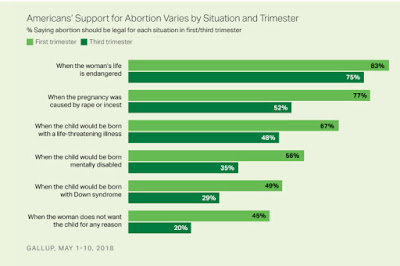Three takeaways from Gallup abortion polling
Gallup recently released a series of articles on its latest abortion survey, which goes into much more detail than previous years. There’s far more data than I can realistically cover in a blog post, but here are three things that caught my eye.
Confusion about why women seek abortions: 60% of Americans say that abortion should “generally be legal” in the first trimester. (Second- and third-trimester abortions do not have majority support.) But when asked about specific reasons for having an abortion in the first trimester, a different picture emerges (click to enlarge):
 |
| Side note: the questions about first-trimester abortions for fetal disabilities don’t make sense. Down Syndrome and other issues are generally diagnosed later in pregnancy. |
Abortion when the woman does not want the child for non-medical reasons—that is, elective abortion—is opposed by a majority of Americans, even in the first trimester! So how is it that 60% believe first trimester should generally be legal, while only 45% support first trimester elective abortion? “Generally legal” means allowing elective abortions! It’s the same question asked two different ways!
Unless… people are under the mistaken impression that most first trimester abortions are not elective. That explains the results. The reality is that the overwhelming majority of abortions—upwards of 75%—are sought for socioeconomic reasons, not medical ones. Rape and incest account for less than 1.5% of abortions. Nearly a quarter of women cited “husband or partner wants me to have an abortion” as a reason.
We should emphasize the reasons women abort in our educational efforts. It’s also important to explain that widely supported limits on abortions after the first trimester cannot be put into place until Roe v. Wade and its progeny are overturned.
No Trump effect. I worried publicly that the election of Donald Trump to the presidency, and pro-life organizations’ support for him, would tarnish the movement’s reputation and impair our ability to save lives. At the very least I thought that people with anti-abortion views would become shy, telling pollsters they were pro-choice or undecided in an effort to distance themselves from President Trump.
I’m very glad to have been wrong about this one. While Trump obviously remains a divisive figure, thankfully this hasn’t turned the public away from support for human life. In fact, the pro-life position has gained a couple of percentage points since 2016.
“Personally pro-life” is dead. In addition to asking whether abortion should be legal or illegal in various circumstances, Gallup also asks about the morality of abortion (emphasis added):
By a slim five-percentage-point margin, 48% to 43%, Americans believe abortion is wrong from a moral perspective. In fact, abortion is the moral issue among those tested on which the public is most closely divided.
The 43% who believe abortion to be morally acceptable matches the percentage who say it should be legal in all or most circumstances.
Since Gallup first measured attitudes about the morality of abortion in 2001, an average of 41% have regarded it as acceptable and 49% as wrong. Though attitudes have fluctuated, at no point have more Americans said abortion is morally acceptable than have said it is morally wrong.
Read that sentence again. Everyone surveyed who said abortion should be legal in all or most circumstances also said that abortion is morally acceptable. The bloc saying that abortion is morally unacceptable, but should be legal anyway—the infamous “personally pro-life” compromise—has vanished. And good riddance! It was always a cop-out. Now we can have a real debate about what abortion is and does.

Leave a Reply
Want to join the discussion?Feel free to contribute!